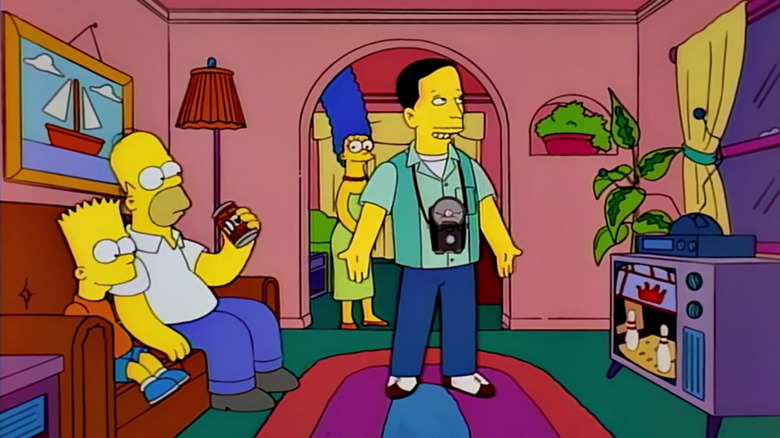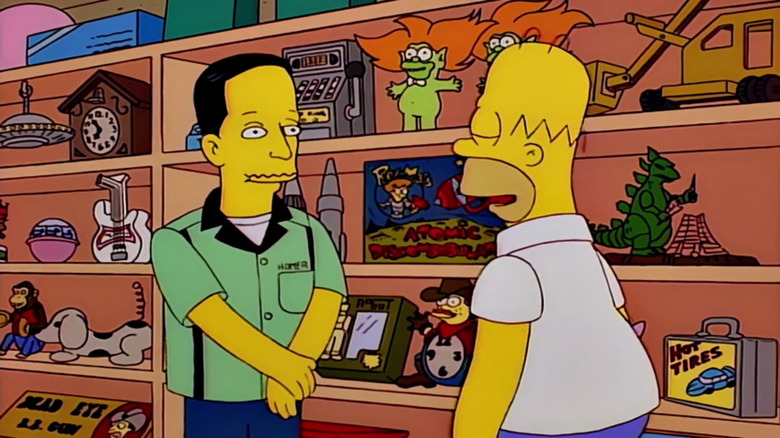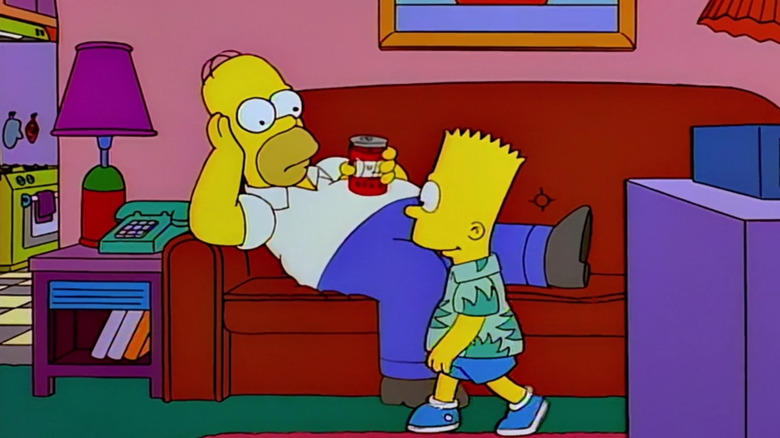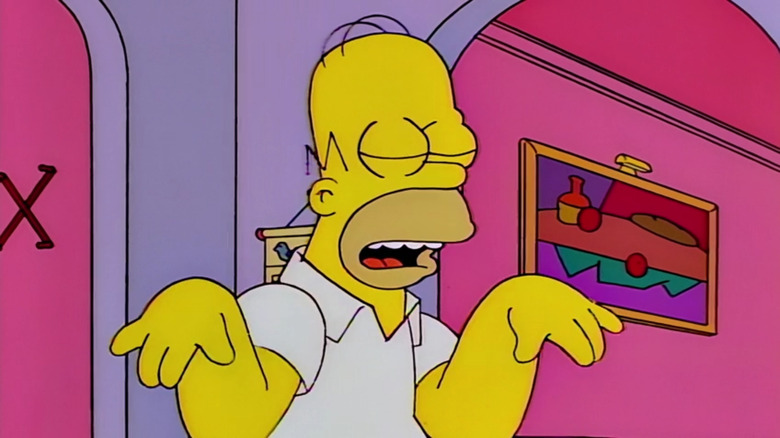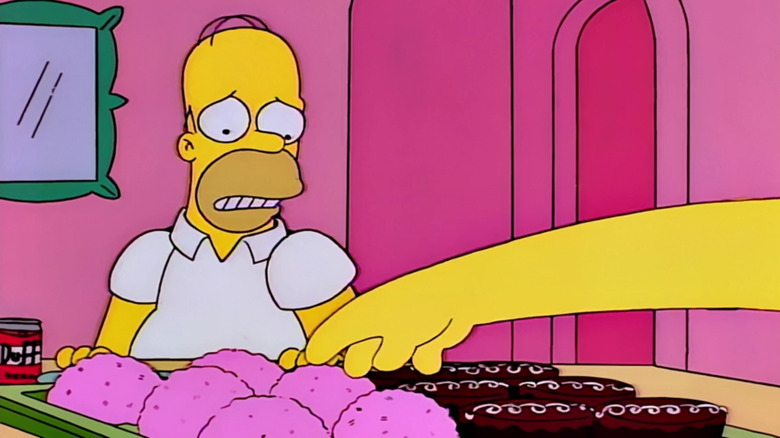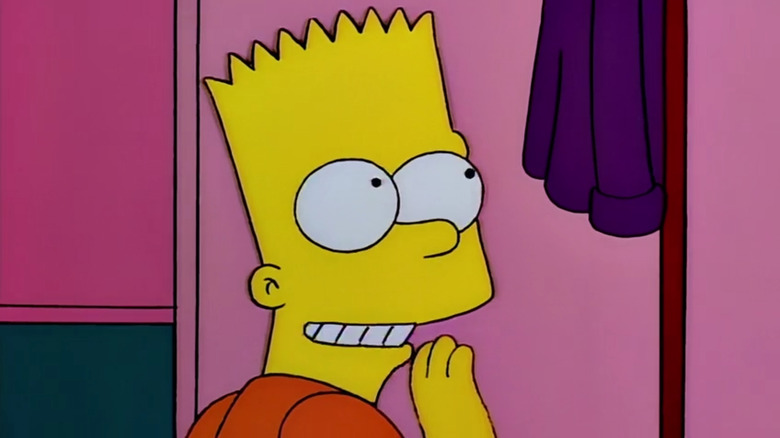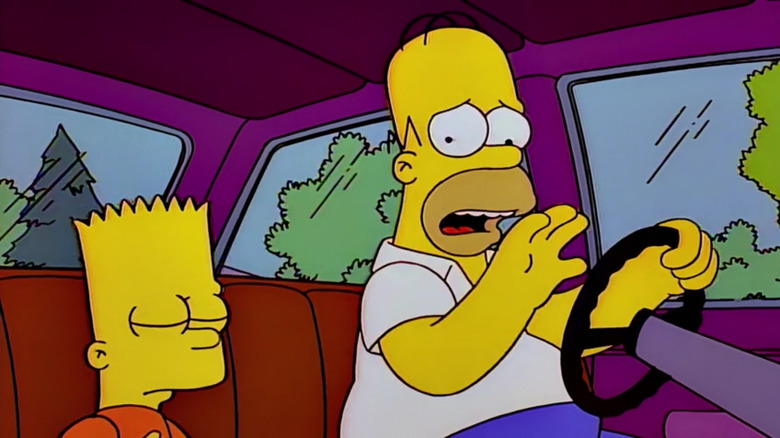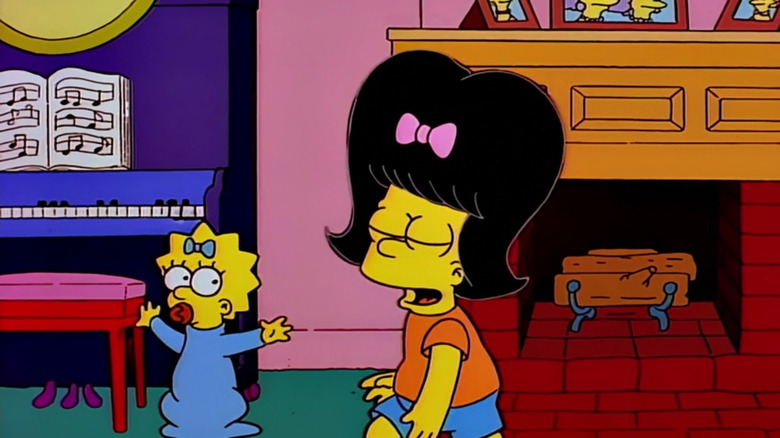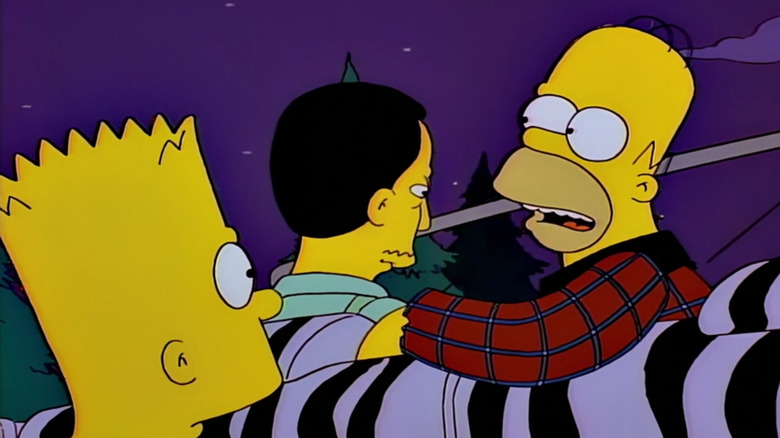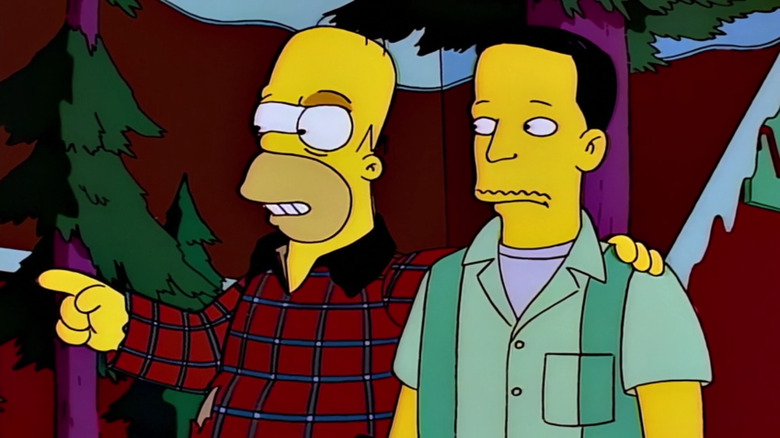How John Waters' Guest Spot Helped The Simpsons Dismantle The Groomer Narrative 27 Years Ago
One of the coolest aspects of classic-era episodes of "The Simpsons" is how dated they don't feel. Yes, the first two seasons have animation of a questionable quality, but by the time you get to seasons 5 through 9, it's easy to forget you're watching something from 20-plus years ago. That extended sequence where Stampy the Elephant stomps his way through the Republican and Democratic party conventions could play almost exactly the same in a 2022 episode, and no one would blink.
The show in this period only really feels dated in sudden bursts. You'll be watching "The City of New York vs. Homer Simpson" and be thrown off by the sudden extended sequence with Homer at the World Trade Center, or you'll watch "Lisa's Wedding" and realize that even when the show's jumping 15 years into its future, that future is now already 12 years behind us. (What even is time, anyway?) It turns out that most of the societal problems classic Simpsons poked fun at have only gotten worse over time, which is bad news for the world but great news for the show's relevance.
Every once in a while, however, there'll be an episode that repeatedly, consistently reminds viewers what year this all takes place in. That's the case with "Homer's Phobia," the 1997 episode that likely would've been written differently if it had come out even just a few years before, or a few years after. Although "The Simpsons" was never shy about trading in gay jokes, this was the first time they did an entire episode centered entirely around gay issues. Despite what all those jokes at Smithers' expense might have you expect, this resulted in one of the most thoughtful episodes of the entire series.
Guest star John Waters
The plot of the episode kicks off when the Simpson family meet a collectibles shop owner named John, a one-off character played by beloved and controversial filmmaker John Waters. Like Waters, John the character has a pencil mustache, he's loves campy things, and (as Homer takes a long time to figure out) he's also gay.
"They asked me to do it and I liked the script and I said yes," Waters would later say about the episode. Although he wasn't a writer on the episode — the script was written by Ron Hauge, who also wrote that "Marine Biologist" episode of "Seinfeld" — the writers did ask him for input on certain aspects. Mainly, they were worried the episode would be offensive to the gay community.
Waters' main request was that they slightly rewrite the scene where Homer's going off about the way the queer community had reclaimed the word queer. "I resent you people using that word," Homer says. "That's our word for making fun of you! We need it!" In the original script, the word being used was "f**," which was probably best left on the cutting room floor. As one fan account commented long afterward, "I, for one, am SO glad Homer never ended up calling John a f**."
The other change at Waters' request was a line where John responded to Homer's homophobic tirade by saying to Marge, "You know who would like him? My dad." The line ended up cut entirely, because John Waters himself was actually on good terms with his father at the time, and didn't want to do anything that might ruin it.
What 'Homer's Phobia' is all about
Although Homer and John initially get along, things fall apart the next morning. It takes awhile, but eventually Marge makes it clear to Homer that John is a gay man. Homer feels betrayed, almost violated, and his anger gets worse when Bart starts picking up some of John's mannerisms.
In the episode's second act, the story shifts away from Homer's relationship with John and focuses more on his fear that Bart has been "turned" into a homosexual himself. First Bart starts using some of John's catchphrases, and then Homer finds Bart walking around in a Hawaiian shirt. "There's only two kinds of guys who wear Hawaiian shirts: gay guys and big fat party animals," Homer cries to Marge later. "And Bart doesn't look like a big fat party animal to me!"
Things escalate, and Homer tries some questionable methods to "turn" Bart straight again. First he has Bart sit for hours in front of a billboard of scantily-clad women. Then he takes Bart to a steel mill, even though everybody knows the whole steel industry's gone gay for years by this point. The final act centers around Homer, Moe, and Barney deciding to take Bart out to kill a deer.
Moe assures Homer, "After the boy bags a deer, all the diet soda in the world won't turn him back," but the night ends with the group getting attacked by a horde of angry reindeer. John comes in to save the day, and Homer finally realizes the guy isn't so bad. "Well, Homer, I won your respect, and all I had to do was save your life," John says. "Now if every gay man could just do the same, you'd be set."
The dated parts
Overall, the episode was well-received, although not without its fair share of criticism. In addition to the expected number of viewers outraged at the positive portrayal of a gay character, there were also the viewers who found Homer's bigotry too much to deal with. As TV critic Dennis Perkins noted in 2015, Homer's insults "strike a harsher note than is usual for him."
While it's pretty clear at all points that Homer's being an idiot, and that the writers don't condone his behavior towards John, for a lot of queer viewers it can sting to be reminded over and over again that Homer Simpson, quite possibly the most beloved cartoon character of all time, would absolutely hate you if you met him in real life. It's similar to that cold splash of reality that comes with the season 6 Vito arc in "The Sopranos," where the show reminds us over and over again that all these beloved characters are deeply, violently homophobic. Even if the social commentary's not lost on you, it can still be a deeply unpleasant viewing experience.
The episode's especially jarring because Homer never acts like this towards gay people during the rest of the show, before or after "Homer's Phobia." Just a few seasons earlier, he was comfortably hanging out at a lesbian bar, only leaving due to his reasonable concern over their lack of a fire exit. When Patty comes out of the closet in season 16, it's Marge who struggles to accept the news whereas Homer is mostly supportive. This gives the "Homer's Phobia" a strange vibe, as we're not really watching our Homer, but a version of Homer with his usual jerkass attributes dialed up to eleven.
Where it's not dated at all
While some of the stereotypes feel very '90s, what's aged well is the episode's repeated mockery of the idea that queerness is some sort of contagious thing. Bart picks up on some of John's mannerisms because he thinks John's a cool, funny guy, but Homer instantly interprets it as signs of Bart becoming gay. He sees Bart's sexuality as something that's currently in flux, something that needs to be rectified now before he gets older and it becomes set in stone.
It's an idea that's unfortunately timely due to the latest wave of cultural backlash against the LGBTQ+ community, the "groomer" discourse that the far right seems to be going all-in on. Trying to paint queer people as inherently dangerous to children is hardly a new tactic, but it's especially worrying today because of how the internet's given reactionaries the unprecedented ability to run large-scale harassment campaigns against regular citizens.
Harmed perhaps the most by this trend are queer schoolteachers. In April of this year, a fifth grade teacher posted a video on TikTok where he talked about how he responded when his students asked if he was gay. He answered his students' questions in what seemed to be a thoughtful, measured manner, which apparently qualifies him as a groomer. "Any teacher who comes out to their students should be fired on the spot," Chaya Raichik of the anti-LGBTQ+ Libs of TikTok account wrote, and the video spread around like wildfire in far-right spaces. This is hardly the only teacher this sort of thing has happened to; many of them end up having their personal information exposed to the whole internet. Many have lost their jobs and have been on the receiving end of countless death threats.
Mocking the fear-mongering
The groomer narrative isn't just terrible in how it's led to large swaths of online bigots targeting individual private citizens, but in how its led to anti-LGBTQ+ legislation throughout the country. Florida's "Stop the Sexualization of Children Act" has a title that seems perfectly reasonable, until you realize that by "sexualization of children," the politicians passing it are referring to teachers acknowledging the existence of queer people to their students, respecting their students' identities, or affirming that being queer isn't a bad thing.
The logical endpoint of the groomer narrative is clear: many of the people pushing it want the general public to associate queer people with child predators, and they want to make it impossible for queer people to have a job that involves interacting with children in any capacity. These motivations aren't new, but the intensity and prominence of them — and the overall success with which right-wing politicians are building off of anti-LGBTQ+ hysteria — feel like a massive step in the wrong direction, taken with alarming speed.
"A state hasn't passed a law like this in more than 20 years," said the legal director for the National Center for Lesbian Rights about Florida's recent "Don't Say Gay" bill. "Like many other people, I thought there was no way they would, because it's so draconian and obviously unconstitutional." In other words, these new bills being passed feel like something that should've been left behind in the '90s and early 2000s. Five years ago, Homer's attitudes in "Homer's Phobia" felt dated, but in 2022 it feels like Homer's just repeating the sort of talking points you'd see today in the trending section on Twitter.
Who's grooming who here
As "Homer's Phobia" makes clear, however, the only person harming Bart in this episode is Homer himself. When Homer puts pre-pubescent Bart in front of the sexually-provocative billboard ad in an attempt to turn Bart straight, this is far more inappropriate that anything John's done throughout the episode. Its reminiscent of the attitudes of guys who freak out over the idea of kids being exposed to the existence of drag queens, who then bring their young sons to Hooters without thinking twice about it.
It's a double-standard so ingrained that it doesn't even get registered by most as a double-standard, but "The Simpsons," back in 1997, was able to pick up on it and point it out. For all Homer panics about John turning Bart gay, John doesn't mention his sexuality around the kids at all, nor does he even say anything remotely sexual around them. It's the mere fact that he's gay that makes Homer see John's actions through a sexual lens, whereas Homer can go around fretting about a child's future sex life without ever realizing how creepy or invasive this is.
Probably the most blatant moment making fun of this attitude comes halfway through the episode when Homer tells Bart he loves him. It's almost a sweet moment, but then Homer panics and blurts out "As a father! A father, a regular father!" Gay panic has broken this man's mind so much that he can't even tell his son he loves him without clarifying that he doesn't mean it in a romantic way.
The absurdity of certain gender expectations
Throughout the episode, we see Bart doing normal, innocent kid stuff. He picks the "gay" pink-frosting dessert over the "straight" chocolate dessert. He wears a woman's wig at one point while goofing around with his siblings, and when Homer offers him a cigarette and asks him what brand he likes, Bart says "anything slim." That last example's a little ridiculous, but the point is that none of this has any correlation with Bart's sexuality, and the episode's mocking Homer for trying to read so much into everything.
It's a lot like that "Curb Your Enthusiasm" episode a decade later where Larry David buys a flamboyant child a sewing machine, and the boy's mother gets mad because she thinks Larry's trying to turn the kid gay. Larry's wrong about a lot of things, but in this episode he's pretty spot-on: the sewing machine is not going to have any impact whatsoever on the kid's sexuality. An innocent gift given to a kid who's expressed clear interest in designing clothes is interpreted as some sort of insidious act on Larry's part, whereas the kid himself is just happy for the thoughtful present.
Both "Curb" and "The Simpsons" understand that adults' fretting over childhood innocence rarely has anything to do with the kids themselves. The kids are fine; Bart doesn't care or even seem to notice John's sexuality one way or another. The only damage done is when Homer starts reading into things, and "Homer's Phobia" digs into just how miserable this approach makes everyone involved. Nobody seems to be enjoying that hunting trip Homer feels compelled to take Bart on, but because Homer sees hunting animals as a straight, masculine hobby, he'll have no qualms about forcing Bart to shoot a reindeer.
Understanding that the kids are not in danger
As the number of young people openly identifying as LGBTQ+ has risen over the years, this has often been used as proof that the so-called queer agenda is successfully brainwashing children. "The powers that be in our culture really really really want your child to be gay or trans," said far-right pundit Matt Walsh. (He says something along these lines about once a week or so.)
The more likely explanation is that the rise in people identifying as queer is simply due to the lower stigma around it. The graph tracking left-handedness over the years is often used as a simple response to homophobic hysteria: the percentage of left-handed kids rose and then leveled out throughout the 20th century because kids stopped being punished for it, not because the left-handed agenda successfully brainwashed them. Likewise, the number of queer people likely isn't actually growing; it's just that now that there's less stigma around it, we're getting a more accurate look of what percentage of the population has been LGBTQ+ this whole time.
"Homer's Phobia" understands, more so than many people in 2022, that kids can't be "turned" queer. The episode understands that being in the presence of a regular queer adult is not going to have any major effect on them besides maybe turning them into a more open-minded, respectful person. As unhappy as Homer is throughout the episode, at no point does it seem like there's anything really wrong with Bart. He's just a kid doing kid things; the only thing Bart cares about with John is that he's fun and friendly, which is the only thing that really matters to a kid.
Not too preachy
One interesting thing you notice after a repeat viewing of "Homer's Phobia" is how little Lisa is in it. It's strange, especially considering that the script was originally meant to tie together two separate story threads, one of which was titled "Lisa and Camp." Early on, there was a version of this episode that centered around Lisa discovering a fascination with the sort of campy things that John's character loves. There, Lisa presumably was a major character.
Instead, the plot of "Homer's Phobia" leans more into the other original story thread for the episode, titled "Bart the Homo," which "focused on other characters" — not just Homer — "questioning Bart's sexuality." Throughout the finished episode, Lisa takes a passive role, getting a one-liner in here or there but never being the main focus. Whereas you'd usually expect strong-willed Lisa to be getting on Homer's case for his small-mindedness, that role goes to Marge.
This choice makes sense, though, because it helps to stop the overall message from feeling too blunt. Marge is presented here as a voice of reason, but not as a particularly articulate voice of wisdom. She's annoyed by Homer's nonsense, but she's not quite able to effectively shut his arguments down in the way that Lisa would easily be able to. The overall point the episode's making feels more persuasive as a result, because those in the audience who might sympathize with Homer's concerns don't feel like they're being preached to the whole way through.
Persuading through laughter
One of the reasons classic Simpsons has aged better than other animated shows like "South Park" or "Family Guy" is because the show usually takes a more indirect approach to hot-button issues. For the most part, the show gently pokes fun at things rather than angrily tear them down. When it comes to changing people's minds and not just satisfying the people who already agree, the approach of "The Simpsons" tends to work a lot better.
Of course, a big reason early seasons of "The Simpsons" took this approach was because they were making their show in a much more restrictive environment than the others had to deal with. "South Park" never seemed to have any trouble getting their aggressively edgy material on air at Comedy Central, whereas its a minor miracle that "Homer's Phobia" got on the air at all. When the writing staff originally submitted the script for approval, they were told, "The entire subject and content of this episode is unacceptable for air," and it was only because of a change in staff at Fox that the script ended up getting approved at all.
Even beyond network meddling, the episode had to air at a time where the general American public was far, far less accepting towards the queer community than it is today. The writers of "Homer's Phobia" knew exactly how controversial its subject matter was going in, and put in the extra effort to win a skeptical audience over to people like John Waters. It was a major risk for the show, but one that definitely seems to have paid off.
"I've always said the only way to change anyone's opinion is to make him laugh first," Waters has said about the episode. "It still is."
